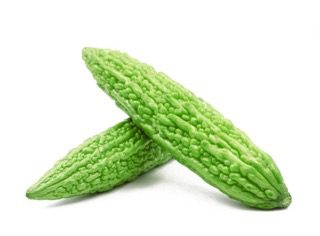

Bitter melon, also known as Bitter gourd, is safe for dogs to consume in moderation. However, the red seeds of the mature bitter melon should be avoided as they are toxic and can cause health issues.
Bitter melon is a rich source of vitamins C and A, which boost the immune system and promote eye and skin health. It also contains vitamin B9 (folate) that provides energy and high fiber content that aids in healthy digestion. Additionally, bitter melon has antioxidant and anti-diabetic properties.
Consuming the red seeds of the mature bitter melon can lead to headaches, fever, abdominal issues, and severe side effects. Bitter melon also has an astringent flavor that may not be palatable to dogs. Overconsumption can cause digestive problems, such as vomiting and diarrhea.
Bitter melon can be served to dogs raw or cooked, with cooking helping to reduce the astringent flavor. It’s important to remove the seeds and cut the vegetable into bite-sized pieces, serving it to your dog in moderation.
Bitter melon, also known as Bitter gourd, is a fruit that is commonly used in Asian cuisine. It originated in India and is now widely cultivated in Asia, Africa, and the Caribbean. Bitter melon is safe for dogs to consume in moderation and has several health benefits, including boosting the immune system, promoting eye and skin health, aiding in healthy digestion, and having antioxidant and anti-diabetic properties. However, the red seeds of the mature bitter melon should be avoided as they are toxic and can cause health issues.
Although bitter melon is generally safe for dogs, there are some risks associated with its consumption. The astringent flavor may not be palatable to dogs, and overconsumption can cause digestive problems such as vomiting and diarrhea. It's also important to avoid feeding dogs the red seeds of the mature bitter melon as they can cause serious health issues.
Bitter melon is relatively affordable and easy to access, but it's important to serve it to your pup in moderation. You can serve bitter melon raw or cooked; cooking helps to reduce the vegetable's astringent flavor. It's crucial to remove the seeds and cut the vegetable into bite-sized pieces before serving it. If your dog is not fond of the vegetable, you can try adding it to their regular food. However, it's important to monitor them for any adverse reactions.
If you're looking for alternatives to bitter melon, you can try other vegetables such as carrots or green beans, which are also high in vitamins and fiber. I hope your furry friend enjoys trying new foods and trying bitter melon in moderation. Have you ever fed your dog bitter melon before? How did they like it? Let us know in the comments below! Remember to always consult with your veterinarian before adding anything new to your dog's diet.